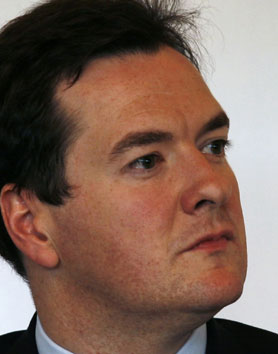Ireland debt: Osborne ponders aid options
George Osborne tells Channel 4 News a healthy Irish economy is in “Britain’s national interest”, as he considers all the options to help the country out of its debt crisis, writes Faisal Islam.
I’ve just been talking to the Chancellor George Osborne at a briefing in Brussels after his lunch with fellow European finance ministers about the Irish debt question.
It is very clear that should Ireland ask for aid, then direct loans from the UK to Ireland are on the cards, as part of an effort to recapitalise and refund the Irish banking. It is still an “if”, as the Chancellor said just moments ago: “These are precautionary discussions”.
However he went further than I believe he would have had the problem affected, say, Portugal or Greece. The Chancellor said: “In terms of the assistance that we might provide [if Ireland asks] I won’t speculate. There are a number of different avenues open and we are looking at all of those”.
There are a number of different avenues open and we are looking at all of those. George Osborne
He said the motives for this were “Britain’s national interest” and the economic health of a nation with which “we share a land border”.
I asked Mr Osborne directly if the Bank of England or the FSA had raised concerns about UK banks’ $220bn exposure to Irish banks. He replied: “UK banks have passed stress tests, and our engagement in this is because we are good neighbours of Ireland and not because of particular UK banks”.
And then in statements remarkably supportive of Ireland’s embattled finance minister Brian Lenihan, Mr Osborne politely declined to criticise Ireland’s low corporation tax that has helped shrink the Chancellor’s tax base.
What is Britain's role in the rescue bid?
After days of negotiation, Ireland has agreed to work with the European Union and the International Monetary Fund. It's a process which could lead to the bail-out Ireland has so far resisted.
Read more: UK's role in the rescue bid
“It’s up to countries to decide their own tax policies. That’s a principle I hold dear,” he told me.
Whatever the thinking behind these statements, the Chancellor seems to have strengthened Dublin’s hand in tough negotiations with Europe that start tomorrow. Very neighbourly indeed.

EU bail-out
The Chancellor was speaking after talks in Brussels with his EU counterparts, at which Ireland’s finance minister Brian Lenihan repeated Dublin’s rejection – so far – of a bail-out offer from the member states.
The fact that Ireland agreed last night to open its books to a team of EU, European Central Bank and International Monetary Fund (IMF) experts reinforced the view that a multi-billion pound bail-out is on the cards, sooner rather than later.
IMF staff were expected to arrive in Dublin tonight to start work on what EU economics and monetary affairs Commissioner Olli Rehn described as “an intensification of preparations of a potential programme in case it is requested and in case it is necessary”.
There is a Eurozone fund to sort out problems in the Eurozone which should be used. We shouldn’t be involved. MP Peter Bone
Britain ‘should not pay bail-out funds’
The government was called to speak about the bailout in the Commons today following an urgent question from Conservative backbencher Peter Bone.
Mr Bone told Channel 4 News Britain should not be expected to commit money to bail-out an Eurozone member.
“Ireland is in the Eurozone. There is a Eurozone fund to sort out problems in the Eurozone which should be used. We shouldn’t be involved,” Mr Bone told Jon Snow.
“The problems have been caused by the European Union and particularly by the remarks of the German Chancellor. They set a fund up with 440bn euro in it and that should be used to bail-out the Irish economy.
“We’re talking about Ireland perhaps needing 80bn euro, so there’s plenty of money in that fund – I have no idea why it is being suggested that British taxpayers should pay this money when we’re not in the Eurozone.
“If it is in the judgement of the British government that there should be a bilateral loan – that of course is understandable. What we shouldn’t do is commit funds through the EU.
“There comes a stage when we have to say to the EU that enough is enough.”